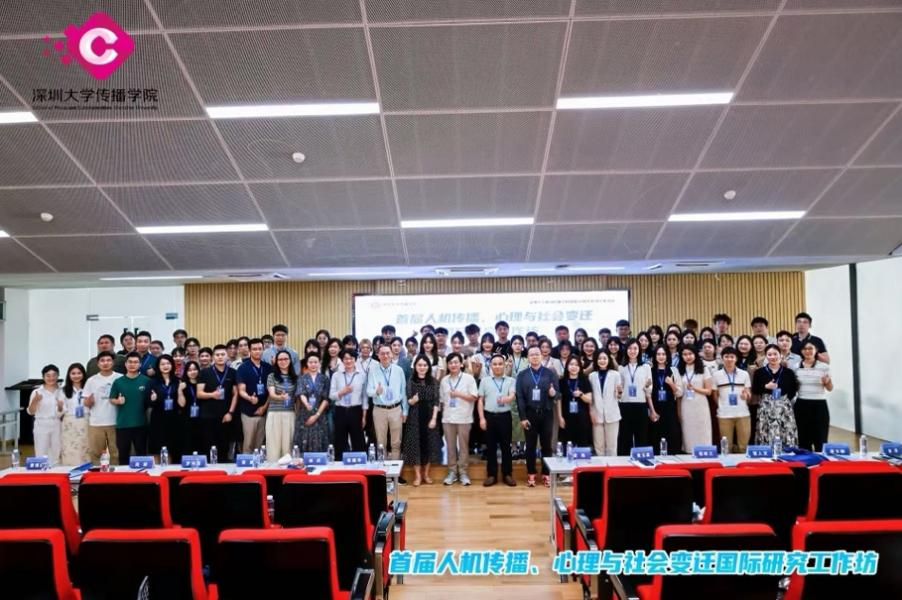On May 17, 2025, the School of Media and Communication (SMC) at Shenzhen University hosted the inaugural International Research Workshop on Human-Machine Communication (HMC), Psychology, and Social Change. The event brought together nearly 60 scholars and students from leading universities—including City University of Hong Kong, the Chinese University of Hong Kong, the National University of Singapore, Tsinghua University, Peking University, Shanghai Jiao Tong University, Renmin University of China, Communication University of China, Beijing Normal University, Zhejiang University, Wuhan University, Sun Yat-sen University, South China University of Technology, among others. The workshop served as a platform to explore how intelligent agents such as AI chatbots are reshaping communication behaviors, psychological mechanisms, and social structures.
The workshop opened at 9 a.m. with a welcome speech by Professor Guang Yang, Associate Dean of SMC at Shenzhen University. She warmly greeted the attendees and expressed her gratitude for their participation. Reflecting on the 40-year history and development of journalism and communication studies at Shenzhen University, Professor Yang emphasized the importance of cultivating an academic community grounded in shared intellectual curiosity. She expressed hope that the workshop would inspire meaningful dialogue and collaboration.
The keynote session was moderated by Associate Professor Bolin Cao, Head of the Department of Internet & New Media. Distinguished keynote speakers delivered thought-provoking presentations, for examples:
▪ Professor Jianhua Zhu, Chair Professor at City University of Hong Kong, introduced the concept of Deep Description in human-machine communication (HMC) research, sparking lively debate with his interpretation of “Unknown Knowns”.
▪ Associate Professor Hai Liang, from the Chinese University of Hong Kong, shared findings on the “Mainstreaming Effects of Large Language Models,” suggesting that long-term interactions with AI may mirror the cultural effects described in cultivation theory.
▪ Professor Di Zhang, from Renmin University of China, addressed “How Culture Shapes AI’s Privacy Logic,” using data from 25 countries to analyze how cultural differences influence user behavior in AI-driven self-diagnosis scenarios.
A poster session and peer review were held on the 8th floor of Zhiyi Building. Assistant Professor Luye Bao from Peking University HSBC Business School and Lecturer Hua Li from Beijing Normal University provided in-depth feedback to twelve student presenters.
In the afternoon, six parallel forums focused on specialized topics: “Reconstructing Relationships and Interactive Practices in HMC,” “Emergence, Boundaries, and Risks of Human-Machine Relations,” “Self-Construction and Persuasion in HMC,” “Empathy and Psychological Healing in Human-Machine Interactions,” “Cognitive Justice and Strategic Communication in HMC,” “Trust-Building and Social Embedding of AI Systems.” Participants presented and discussed the role of AI in education, intimate relationships, team collaboration, algorithmic persuasion, and cyber divination. Forum commentators included, but were not limited to, Professors Kunjin Luo (Guangdong University of Foreign Studies), and Jian Rui (South China University of Technology), as well as Associate Professors Wenjing Pan (Renmin University of China), and Qing Huang (Zhejiang University).
The workshop concluded with an awards ceremony recognizing outstanding papers. Assistant Professor Bingcan Li hosted the closing session and announced the winning papers. Judges Associate Professor Wenjing Pan and Professor Jian Rui encouraged young researchers to continue pushing boundaries and engaging in interdisciplinary dialogue. Awards were presented by Professor Yubo Huang, Associate Dean of SMC (Shenzhen University), Assistant Professor Renwen Zhang (National University of Singapore), and Associate Professor Hai Liang (Chinese University of Hong Kong).
The workshop was jointly organized by the SMC at Shenzhen University and the Intelligent Communication and Digital Society Governance Lab, a Guangdong Provincial Key Research Laboratory. It was part of a series of events celebrating the 40th anniversary of journalism and communication studies at Shenzhen University. Associate Professor Bolin Cao served as the workshop convener, with Assistant Professors Rukun Zhang and Bingcan Li as coordinators.
